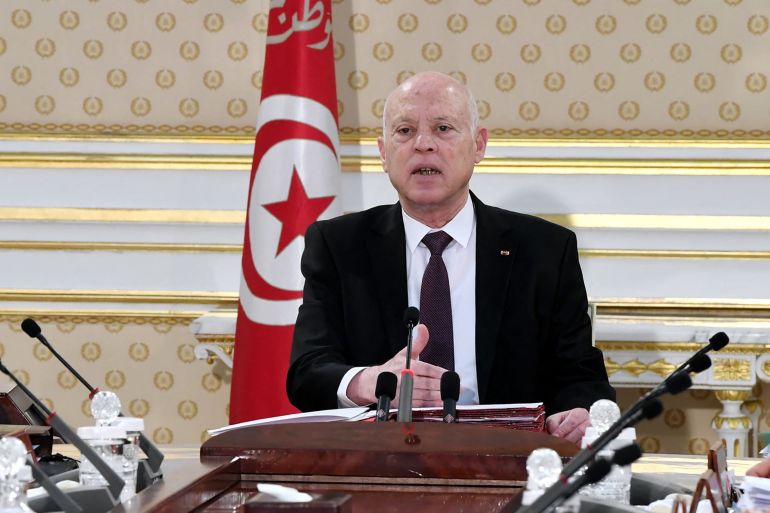Judiciary officials linked to criminal gangs: Tunisia president
President Saied’s comments come as former justice minister was arrested last week and accused of possible ‘terrorism’ offences.

Tunisian President Kais Saied has condemned senior officials in the judiciary and accused them of being linked to what he described as “criminal gangs”.
In a video clip broadcast by the Tunisian presidency on its official Facebook page on Wednesday, Saied said that whoever commits a crime will be tried like other citizens.
Keep reading
list of 3 itemsDetained Tunisian politician hospitalised ‘in critical condition’
Calls mount for release of Tunisia’s detained Ennahdha official
“Everyone knows that some of those who took up leading positions in courts were at the time, and continue to be, an extension of political power groups and criminal gangs,” said Saied.
“The problem is not with the lawyers or noble judges. The issue is with those who commit crimes, taking advantage of the Tunisian people and their resources.”
Saied’s comments come as former justice minister Noureddine Bhiri refused food or medication since his arrest last week by plain-clothes officers after he was accused of possible “terrorism” offences.
It was not clear whether Saied was referring to the former justice minister, who was also deputy chairman of the Ennahdha party that played a central role in Tunisian politics until a power grab on July 25 last year by Saied.
On Tuesday, the public prosecutor’s office said that an investigation had been opened after it received a report “from services combating terrorism and organised crime” that a Syrian couple had allegedly been assigned false identity documents and nationality certificates while Bhiri was head of the justice ministry.
The Tunisian president has repeatedly spoken of the need to “purify” the judiciary.
On July 25 last year, Saied sacked the Ennahdha-supported government and suspended parliament, presenting himself as the ultimate interpreter of the constitution.
He later took steps to rule by decree, and, in early December, promised to press on with reforms to the political system. Critics denounced his move as a coup.
The president has defended his takeover as the only way to end governmental paralysis after years of political squabbling and economic stagnation.
He has promised to uphold rights and freedoms won in the 2011 revolution.
Tunisia was the only democracy to emerge from the Arab Spring revolution 10 years ago, but civil society groups and Saied’s opponents have expressed fear of a slide back to authoritarianism a decade after the revolution that toppled longtime strongman Zine El Abidine Ben Ali.